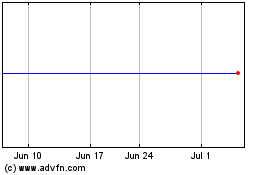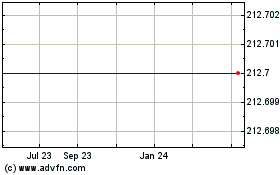ACA Deadline Extended for Those Who Lost Their Health Plans
October 25 2016 - 8:40AM
Dow Jones News
WASHINGTON—Hundreds of thousands of consumers whose health
insurance plans are being discontinued for 2017 will get some
flexibility when signing up for a new plan during the Affordable
Care Act's open enrollment, a sign of continued turmoil in the
exchange markets.
In addition, the Obama administration on Monday acknowledged
that monthly premiums on the exchange's benchmark silver plans will
rise on average 25% before subsidies are factored in. Consumers in
many areas will also have fewer plans to pick from.
Open enrollment for 2017 begins Nov. 1. The Obama administration
wants consumers with discontinued plans on the health law's
exchanges to select a new plan by Dec. 15. That is the main
deadline most will have to abide by to get health coverage starting
Jan. 1.
But for those who realize the deadline too late, there is some
breathing room. Individuals whose plans are being discontinued next
year because their insurer is leaving the exchange will be eligible
for a special enrollment period, according to officials with the
Centers for Medicare and Medicaid Services. That means later
deadlines and the ability to sign up for coverage outside the
regular sign up season that runs from Nov. 1 through Jan. 31.
Individuals who lost coverage can attest to their situation and
sign up as late as Dec. 31 and request coverage to begin on Jan. 1.
If they miss that deadline, they may be able to wait until as late
as March 1 to sign up for 2017 coverage under the special
enrollment rules—although that would mean a lapse in coverage.
The flexibility is necessary because of the unprecedented number
of consumers who are seeing their current health plans canceled as
insurers curtail their exchange participation. It means many
returning consumers could conceivably wait until the last minute to
sign up—a scenario the Obama administration is trying to avoid—or
even enroll weeks after the official end of the open enrollment
season. The flexibility may delay ability to assess the success of
sign-ups for 2017, and could create headaches for some insurers if
they have to process an influx of applications just before the
start of the year.
Major insurers such as United Health Group Inc., Humana Inc.,
and Aetna Inc. are withdrawing from some exchanges, and scores of
consumers have gotten notices informing them their policies will be
discontinued as a result. Premiums are also rising in many states
by double digits, and other consumers are losing their coverage
because smaller insurers have shut down.
Despite the challenges, the Obama administration expects 13.8
million people to select a health plan on the exchanges by the end
of open enrollment—an increase of 1.1 million over the end of
2016's sign up season.
Consumers will see other changes this year. People with
discontinued coverage who don't pick a new plan by Dec. 15 will get
assigned to a new plan that most closely matches their old policy.
They will be informed of the new plan by the administration. Their
new insurers will then send them a letter that includes the
estimated amount of subsidy they are eligible for.
These consumers are under no obligation and still have to pay
their premiums to be enrolled in the new plan.
"This year for the first time there will be a process where the
marketplace will try to match them to the most similar plan," said
Karen Pollitz, a senior fellow at the Kaiser Family Foundation. "It
may or may not be the one you want."
Insurers are staffing up for the extra work it will take to
process the new applications from people in discontinued plans
because of concerns the influx could pose customer-service
challenges. Hiccups are more likely in areas with only one or two
insurers to pick from because other carriers are leaving the
exchange.
More than 70% of consumers in states using the federal exchange
will be able to find a premium that is less than $75 a month once
financial assistance is factored in, according to Health and Human
Services. About 20% of consumers on HealthCare.gov will only have
one issuer to choose from, they said.
Consumers had the ability starting Monday Oct. 24 to begin
browsing plans and policies on the federal site. All but 12 states
now use the federal exchange.
"Our nation has made historic progress under the ACA, and now we
want to build on that progress to further improve affordability,
access, and quality," said HHS Secretary Sylvia Mathews
Burwell.
The higher premiums brought a rebuke from Republicans,
however.
"When the president's allies in Washington will try to spin the
numbers, families across the country will be forced to figure out
how to pay for such unaffordable insurance," said Sen. Orrin Hatch,
(R., Utah).
Write to Stephanie Armour at stephanie.armour@wsj.com
(END) Dow Jones Newswires
October 25, 2016 08:25 ET (12:25 GMT)
Copyright (c) 2016 Dow Jones & Company, Inc.
Aetna (NYSE:AET)
Historical Stock Chart
From Mar 2024 to Apr 2024

Aetna (NYSE:AET)
Historical Stock Chart
From Apr 2023 to Apr 2024
